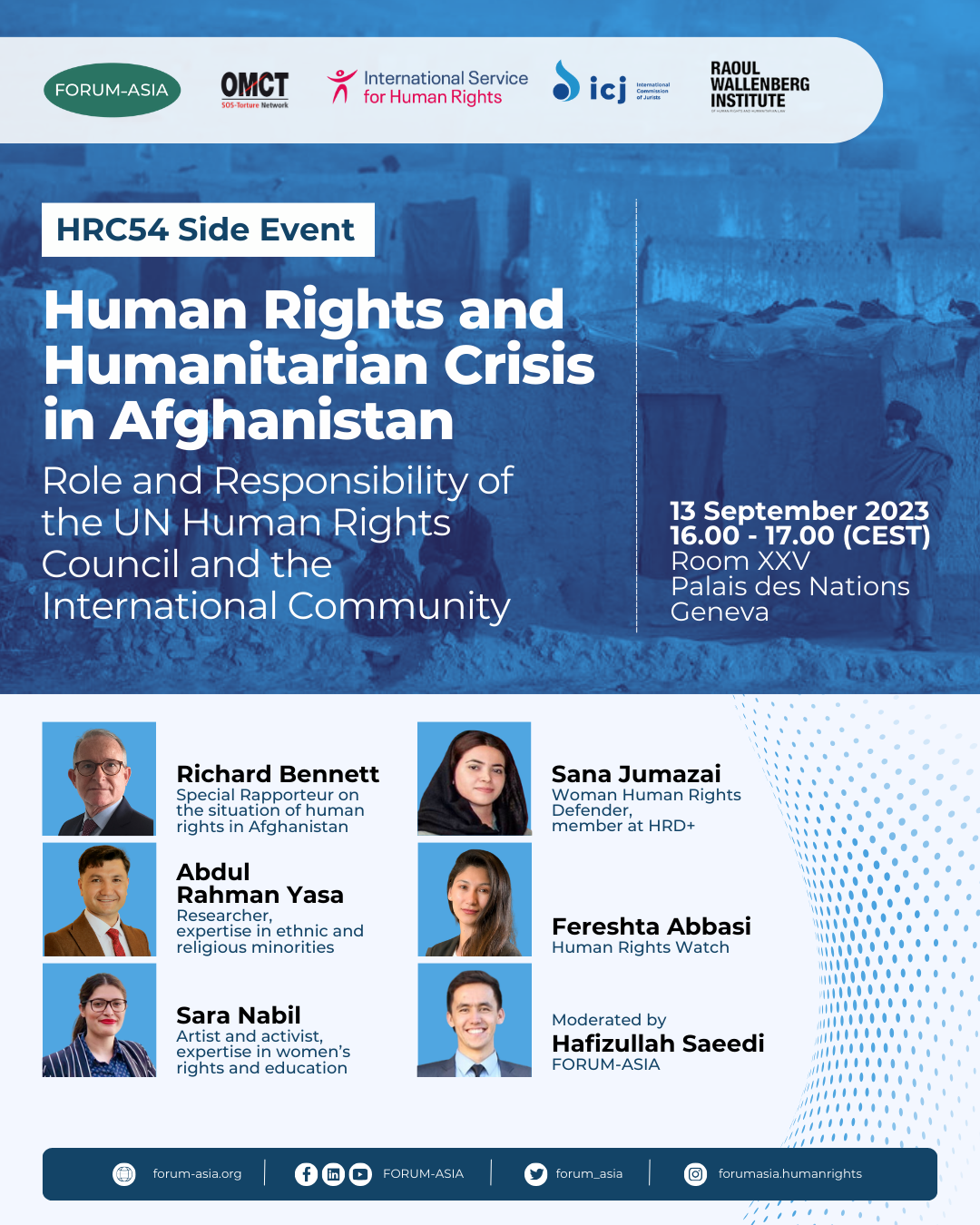
Human rights and humanitarian crisis in Afghanistan: role and responsibility of the UN Human Rights Council and the international community
Organised by:
Asian Forum for Human Rights and Development (FORUM-ASIA)
With support of International Service for Human Rights (ISHR), International Commission of Jurists (ICJ), and World Coalition Against Torture (OMCT)
16h00 – 17h00 CEST, 13 September 2023
Room XXV, Palais des Nations
Two years after the Taliban takeover, Afghanistan has become one of the largest humanitarian crises in the world. Since Taliban’s return to power, Afghanistan’s economy has collapsed, resulting in widespread and ever increasing poverty and food insecurity. Despite the asset releases and aid flows to Kabul, Taliban have failed to address Afghanistan’s deepening humanitarian and economic crises. More than two thirds of the people of Afghanistan are in urgent need of humanitarian assistance and more than 16 million children are left without basic food and essential health care.[1] While international aid remain in adequate, Taliban’s restrictions on fundamental rights and freedoms, particularly of women, as well as its interference in the delivery of humanitarian aid, have exacerbated humanitarian and the economic crisis
In over the two years since Taliban seized power, they have systematically erased women and girls from the society with decrees and proclamations in the name of ‘Sharia’ and continue to hold them hostage. Persecution of ethnic and religious minorities including Shias, Hazaras, Tajiks, Uzbeks, Sufis and Sikhs with targeted attacks from Taliban and other extremist, terrorist groups forcing many into displacement. Reports of forced and child marriages and suicides are on the rise across Afghanistan, while more and more Afghans flee the country fearing persecution.
At the same time, global protection schemes and the humanitarian visa programs for people from Afghanistan have shrunk significantly. Additionally, thousands of Afghan refugees and asylum seekers, especially those in neighbouring countries, face increasing threats of deportation and abuse by border regimes and police.
In the absence of effective accountability measures, Taliban’s rule is perpetuating the human rights and humanitarian crisis. Gender persecution, systematic discrimination and persecution of minorities including Hazaras, forced displacement, lack of and unequal access to humanitarian aid and plight of Afghan refugees require urgent international attention and action. Holding Taliban accountable for their blatant violations and abuses of Afghanistan’s international human rights obligations should be at the center for international action on Afghanistan. It is essential that any attempt to address the multi-faceted crises in Afghanistan is informed by and grounded in the views of the people of Afghanistan, especially human rights defenders and civil society.
Objectives
- To provide a platform for human rights defenders from Afghanistan to draw attention to the ongoing human rights and humanitarian crises in Afghanistan, including new and emerging dimensions of these crises
- To provide recommendations for the UN Human Rights Council and the international community on the measures necessary to address the situation in Afghanistan, including, among others, accountability, humanitarian aid, internal displacement and protection of refugees and asylum seekers
Speakers
- Abdul Rahman Yasa, researcher – expertise in ethnic and religious minorities, formerly Max Planck Foundation for International Peace and Rule of Law, and Civil Society and Human Rights Network (CSHRN)
- Sara Nabil – artist and activist, expertise in women’s rights and education, formerly with Center for Contemporary Arts Afghanistan.
- Sana Jumazai, WHRD – expertise in women and human rights, member at HRD+, formerly with Afghan Women Skills Development Center (AWSDC)
- Fereshta Abbasi, Human Rights Watch
- Richard Bennett, Special Rapporteur on the situation of human rights in Afghanistan
Moderator
- Hafizullah Saeedi, FORUM-ASIA
[1] https://www.unicef.org/rosa/press-releases/afghanistan-childrens-crisis-unicef-afghanistan-representative-fran-equizas-remarks


